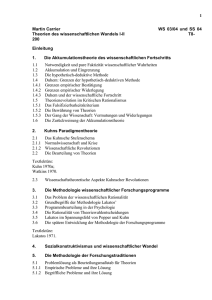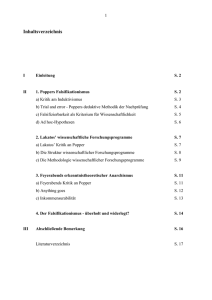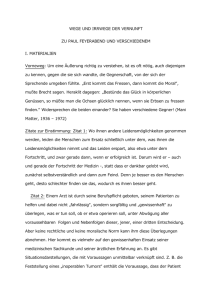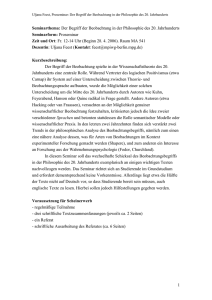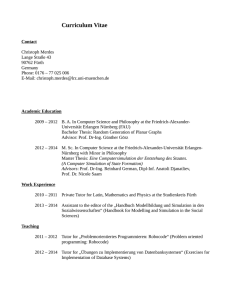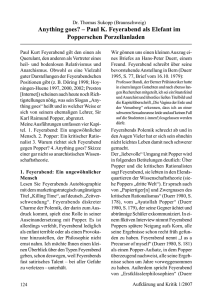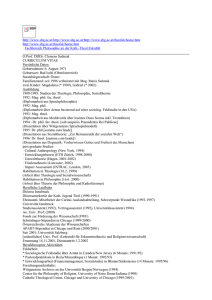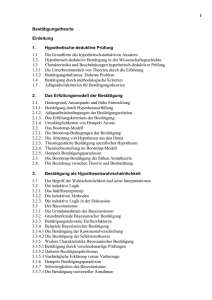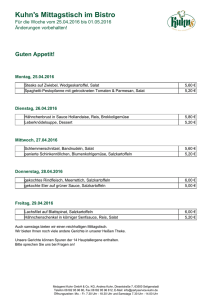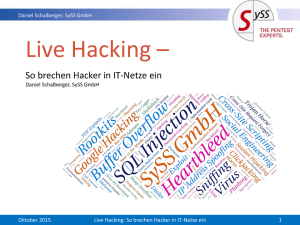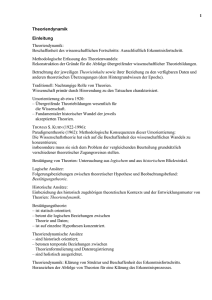Martin Carrier Di 10–12 Theorien des wissenschaftlichen Wandels II
Werbung
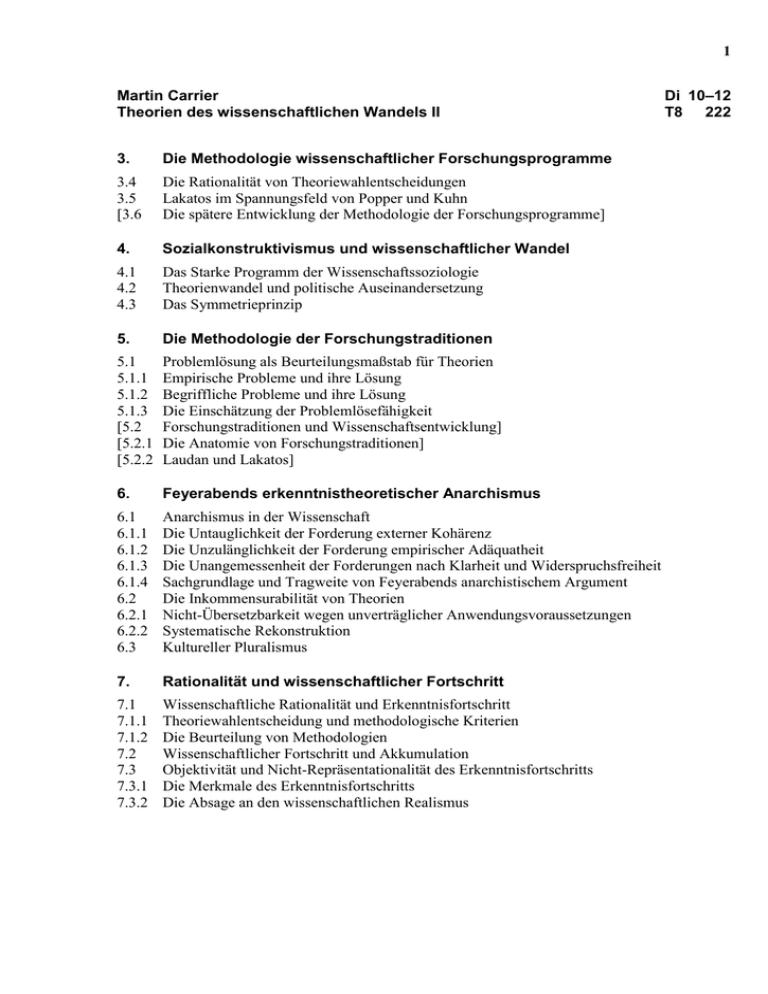
1 Martin Carrier Theorien des wissenschaftlichen Wandels II 3. Die Methodologie wissenschaftlicher Forschungsprogramme 3.4 3.5 [3.6 Die Rationalität von Theoriewahlentscheidungen Lakatos im Spannungsfeld von Popper und Kuhn Die spätere Entwicklung der Methodologie der Forschungsprogramme] 4. Sozialkonstruktivismus und wissenschaftlicher Wandel 4.1 4.2 4.3 Das Starke Programm der Wissenschaftssoziologie Theorienwandel und politische Auseinandersetzung Das Symmetrieprinzip 5. Die Methodologie der Forschungstraditionen 5.1 5.1.1 5.1.2 5.1.3 [5.2 [5.2.1 [5.2.2 Problemlösung als Beurteilungsmaßstab für Theorien Empirische Probleme und ihre Lösung Begriffliche Probleme und ihre Lösung Die Einschätzung der Problemlösefähigkeit Forschungstraditionen und Wissenschaftsentwicklung] Die Anatomie von Forschungstraditionen] Laudan und Lakatos] 6. Feyerabends erkenntnistheoretischer Anarchismus 6.1 6.1.1 6.1.2 6.1.3 6.1.4 6.2 6.2.1 6.2.2 6.3 Anarchismus in der Wissenschaft Die Untauglichkeit der Forderung externer Kohärenz Die Unzulänglichkeit der Forderung empirischer Adäquatheit Die Unangemessenheit der Forderungen nach Klarheit und Widerspruchsfreiheit Sachgrundlage und Tragweite von Feyerabends anarchistischem Argument Die Inkommensurabilität von Theorien Nicht-Übersetzbarkeit wegen unverträglicher Anwendungsvoraussetzungen Systematische Rekonstruktion Kultureller Pluralismus 7. Rationalität und wissenschaftlicher Fortschritt 7.1 7.1.1 7.1.2 7.2 7.3 7.3.1 7.3.2 Wissenschaftliche Rationalität und Erkenntnisfortschritt Theoriewahlentscheidung und methodologische Kriterien Die Beurteilung von Methodologien Wissenschaftlicher Fortschritt und Akkumulation Objektivität und Nicht-Repräsentationalität des Erkenntnisfortschritts Die Merkmale des Erkenntnisfortschritts Die Absage an den wissenschaftlichen Realismus Di 10–12 T8 222 2 Basisliteratur Kap. 3: Die Methodologie wissenschaftlicher Forschungsprogramme Lakatos 1970; Lakatos 1971; Hacking 1979; Hacking 1983, Chap. 8; Chalmers 1982, Kap. 7, 9; Carrier 2002; Musgrave 1974; Musgrave 1976; Feyerabend 1972b, 311-331; Worrall 1978; Worrall 1985. Kap. 4: Sozialkonstruktivismus und wissenschaftlicher Wandel Bloor 1976, Chap. 1; Barnes, D. Bloor & J. Henry 1996, Chap. 1–4; Brown 2001, Chap. 5-7. Kap. 5: Die Methodologie der Forschungstraditionen Laudan 1977; 11-120; Laudan 1981; Feyerabend 1981. Kap. 6: Feyerabends erkenntnistheoretischer Anarchismus 6.1 Anarchismus in der Wissenschaft Feyerabend 1972a; Feyerabend 1972b; Feyerabend 1975; Feyerabend 1978a; Laudan 1989; Couvalis 1997, Kap. 5. 6.2 Die Inkommensurabilität von Theorien Feyerabend 1975, Kap. 17; Feyerabend 1978a; Feyerabend 1962; Laudan 1977, 139-146; Carrier 2001. 6.3 Kultureller Pluralismus Feyerabend 1975, Kap. 18; Feyerabend 1978b. 3 Kap. 7: Rationalität und wissenschaftlicher Fortschritt 8.1 Wissenschaftliche Rationalität und Erkenntnisfortschritt Lakatos 1971; Laudan 1977; 155-170; Hacking 1979; Carrier 1986. 8.2 Wissenschaftlicher Fortschritt und Akkumulation Kuhn 1962, Kap. IX; Laudan 1976; Laudan 1977, 147-150; Hacking 1983, Chap. 9-10; Hacking 1992. 8.3 Objektivität und Nicht-Repräsentationalität des Erkenntnisfortschritts Laudan 1984; Lakatos 1970, 178-182; Lakatos 1974, 154-167; Kuhn 1962, 182-184, 217-218; Chalmers 1982, Kap. 9-10, 13-14. Literatur Asquith, Peter D. & Ian Hacking (eds.) (1981) PSA 1978 II, East Lansing Mich.: PSA, 1981. Barnes, Barry, David Bloor & John Henry (1996) Scientific Knowledge. A Sociological Analysis, Chicago: University of Chicago Press. Bloor, David (1976) Knowledge and Social Imagery, London: Routledge & Kegan Paul. Bloor, David (1981) “The Strengths of the Strong Progamme,” Philosophy of the Social Sciences 11 (1981), 199-213. Brown, James R. (2001) Who Rules in Science?, Cambridge Mass.: Harvard University Press. Carrier, Martin (1986) „Wissenschaftsgeschichte, rationale Rekonstruktion und die Begründung von Methodologien“, Zeitschrift für allgemeine Wissenschaftstheorie 17, 201-228. Carrier, Martin (2001) “Changing Laws and Shifting Concepts: On the Nature and Impact of Incommensurability”, in: P. Hoyningen-Huene & H. Sankey (eds.), Incommensurability and Related Matters (Boston Studies in the Philosophy of Science), Dordrecht: Kluwer, 65-90. Carrier, Martin (2002) “Explaining Scientific Progress. Lakatos’s Methodological Account of Kuhnian Patterns of Theory Change”, in: Kampis, Kvasz & Stöltzner (2002), 53-71. Chalmers, Alan F. (1982) Wege der Wissenschaft. Einführung in die Wissenschaftstheorie, Berlin: Springer, 41994. 4 Couvalis, George (1997) The Philosophy of Science. Science and Objectivity, London: Sage. Farley, John & Geison, Gerald L. (1974) “Science, Politics and Spontaneous Generation in Nineteenth-Century France: The PasteurPouchet Debate”, Bulletin of the History of Medicine 48, 161-198. Feyerabend, Paul K. (1962) „Erklärung, Reduktion und Empirismus“, in: ders., Probleme des Empirismus. Schriften zur Theorie der Erklärung, der Quantentheorie und der Wissenschaftsgeschichte (Ausgewählte Schriften 2), Vieweg: Braunschweig, 1981, 73-125. Feyerabend, Paul K. (1963) „Wie wird man ein braver Empirist? Ein Aufruf zur Toleranz in der Erkenntnistheorie“, in: L. Krüger (ed.), Erkenntnisprobleme der Naturwissenschaften. Texte zur Einführung in die Philosophie der Wissenschaft, Köln: Kiepenheuer & Witsch, 302-335. Feyerabend, Paul K. (1965) “Problems of Empiricism,” in: R.G. Colodny (ed.), Beyond the Edge of Certainty, Englewood Cliffs, N.J.: Prentice-Hall, 145–260. Feyerabend, Paul K. (1972a) „Von der beschränkten Gültigkeit methodologischer Regeln“, in: ders. (1978c), 205-248. Feyerabend, Paul K. (1972b) „Die Wissenschaftstheorie – eine bisher unerforschte Form des Irrsinns?“, in: ders. (1978c), 293-338. Feyerabend, Paul K. (1975) Against Method. Outline of an Anarchistic Theory of Knowledge, London: Verso, 71987. Feyerabend, Paul K. (1978a) „Kuhns Struktur wissenschaftlicher Revolutionen: Ein Trostbüchlein für Spezialisten?“, in: ders. (1978c), 153-204 (rev. aus Lakatos & Musgrave (1974), 191-222). Feyerabend, Paul K. (1978b) „Die Wissenschaften in einer freien Gesellschaft“, in: ders. (1978c), 351-367. Feyerabend, Paul K. (1978c) Der wissenschaftstheoretische Realismus und die Autorität der Wissenschaften (Ausgewählte Schriften I), Braunschweig: Vieweg. Feyerabend, Paul K. (1981) „More Clothes from the Emperor’s Bargain Basement“, The British Journal for the Philosophy of Science 32, 57-71. Feyerabend, Paul K. & Hans Albert (1997) Briefwechsel, ed. W. Braun, Frankfurt: Fischer. Gholson, Barry & Peter Barker (1985) „Kuhn, Lakatos, and Laudan: Applications in the History of Physics and Psychology“, American Psychologist 40, 755-769. Gillies, Donald (2002) “Lakatos’s Criticisms of Popper,” in: Kampis, Kvasz & Stöltzner (2002), 13-22. 5 Hacking, Ian (1979) „Imre Lakatos’s Philosophy of Science“, The British Journal for the Philosophy of Science 30 (1979), 381-402. Hacking, Ian (1983) Representing and Intervening. Introductory Topics in the Philosophy of Natural Science, Cambridge: Cambridge University Press, 1983. Hacking, Ian (1992) „The Self-Vindication of the Laboratory Sciences,“ in: A. Pickering (ed.), Science as Practice and Culture, Chicago: Univ. of Chicago Press, 29-64. Hanson, Norwood R. (1958) Patterns of Discovery. An Inquiry into the Conceptual Foundations of Science, Cambridge: Cambridge University Press, 1965. Kampis, George, Ladislav Kvasz & Michael Stöltzner (2002) (eds.) Appraising Lakatos: Mathematics, Methodology, and the Man (Vienna Circle Library), Dordrecht: Kluwer. Koertge, Noretta (1981) „In Praise of Truth and Substantive Rationality: Comments on Larry Laudan’s Progress and its Problems“, in: Asquith & Hacking (1981), 505-521. Kuhn, Thomas S. (1962) Die Struktur wissenschaftlicher Revolutionen, Frankfurt: Suhrkamp, 21976. Kuhn, Thomas S. (1970b) „Bemerkungen zu meinen Kritikern“, in: Lakatos & Musgrave (1974), 223-269. Kuhn, Thomas S. (1980) „The Halt and the Blind: Philosophy and History of Science“, The British Journal for the Philosophy of Science 31, 181-191. Kuhn, Thomas S. (1983) „Commensurability, Comparability, Communicability“, in: P.D. Asquith & T. Nickles (eds.), PSA 1982.II, East Lansing Mich.: PSA, 1983, 669-688. Kuhn, Thomas S. (1989) „Possible Worlds in History of Science“, in: S. Allén (ed.), Possible Worlds in Humanities, Arts and Sciences, Berlin: de Gruyter, 1989, 9-32. Kuhn, Thomas S. (1990) „The Road since Structure“, PSA 1990.II, East Lansing Mich.: PSA, 1991, 3-13. Kuhn, Thomas S. (1993) „Afterwords“, in: P. Horwich (ed.), World Changes: Thomas Kuhn and the Nature of Science, Cambridge Mass.: MIT Press, 311-341. Lakatos, Imre (1970) „Falsifikation und die Methodologie wissenschaftlicher Forschungsprogramme“, in: Lakatos & Musgrave (1974), 89-189. Lakatos, Imre (1971) „Die Geschichte der Wissenschaft und ihre rationalen Rekonstruktionen“, in: Lakatos & Musgrave (1974), 271-311. 6 Lakatos, Imre (1974) „Popper on Demarcation and Induction“, in: Worrall & Currie (1978), 139-167. Lakatos, Imre & Alan Musgrave (eds.) (1974) Kritik und Erkenntnisfortschritt, Braunschweig: Vieweg. Lakatos, Imre & Élie Zahar (1976) „Why Did Copernicus’s Research Programme Supersede Ptolemy’s“, in: Worrall & Currie (1978), 168-192. Latour, Bruno (1992) “One More Turn after the Social Turn”, in: E. McMullin (ed.), The Social Dimensions of Science, Notre Dame, University of Notre Dame Press, 272-294. Laudan, Larry (1976) „Two Dogmas of Methodology“, Philosophy of Science 43 (1976), 585-597. Laudan, Larry (1977) Progress and its Problems. Toward a Theory of Scientific Growth, Berkeley: University of California Press, 1977. Laudan, Larry (1981a) „The Philosophy of Progress ...“, in: Asquith & Hacking (1981), 530-547. Laudan, Larry (1981b) “The Pseudo-Science of Science”, in: ders., Beyond Positivism and Relativism. Theory, Method, and Evidence, Boulder Col.: Westview, 1996, 183-204. Laudan, Larry (1984) „Explaining the Succes of Science: Beyond Epistemic Realism and Relativism“, in: J.T. Cushing & C.F. Delaney & G.M. Gutting (eds.), Science and Reality. Recent Work in the Philosophy of Science. Essays in Honor of Ernan McMullin, Notre Dame Ind.: University of Notre Dame Press, 1984, 83-105. Laudan, Larry (1989) „For Method: Or Against Feyerabend“, in: J.R. Brown & J. Mittelstraß (eds.) (1989), An Intimate Relation. Studies in the History and Philosophy of Science Presented to Robert E. Butts on his 60th Birthday (Boston Studies in the Philosophy of Science 116), Dordrecht: Kluwer Academic Publishers, 299-317. Laudan, Larry et al. (1986) “Scientific Change: Philosophical Models and Historical Research”, Synthese 69, 141-223. Musgrave, Alan (1976) „Method or Madness? Can the Methodology of Research Programmes be Rescued from Epistemological Anarchism?“, in: R.S. Cohen et al. (eds.), Essays in Memory of Imre Lakatos, Dordrecht: Reidel, 457-491. Popper, Karl R. (1963) Conjectures and Refutations. The Growth of Scientific Knowledge, London: Routledge & Kegan Paul, 41972. Rott, Hans (1994) „Zur Wissenschaftsphilosophie von Imre Lakatos“, Philosophia naturalis 31, 25-62. 7 Shapin, Steven (1981) “Of Gods and Kings: Natural Philosophy and Politics in the Leibniz-Clarke Disputes,” ISIS 72, 187-215. Thomason, Neil (1992) “Could Lakatos, Even With Zahar’s Criterion for Novel Fact, Evaluate the Copernican Research Programme?”, The British Journal for the Philosophy of Science 43, 161-200. Worrall, John (1978) „Wie die Methodologie der wissenschaftlichen Forschungsprogramme die Poppersche Methodologie verbessert“, in: G. Radnitzky & G. Anderson (eds.), Fortschritt und Rationalität der Wissenschaft, Tübingen: Mohr, 1980, 51-78. Worrall, John (1985) „Scientific Discovery and Theory-Confirmation“, in: J.C. Pitt (ed)., Change and Progress in Modern Science, Dordrecht: Kluwer, 1985, 301-331. Worrall, John & Currie, Gregory (eds.) (1978) Imre Lakatos. The Methodology of Scientific Research Programmes (Philosophical Papers I), Cambridge: Cambridge University Press, 1978.
